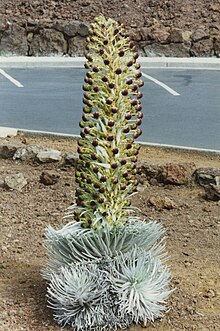Argyrophyton
| Argyroxiphium | |
|---|---|
 |
|
| Haleakalā silversword | |
| Scientific classification | |
| Kingdom: | Plantae |
| Clade: | Angiosperms |
| Clade: | Eudicots |
| Clade: | Asterids |
| Order: | Asterales |
| Family: | Asteraceae |
| Subfamily: | Asteroideae |
| Supertribe: | Helianthodae |
| Tribe: | Madieae |
| Genus: |
Argyroxiphium DC. |
| Synonyms | |
|
Argyrophyton Hook. |
|
Argyrophyton Hook.
Argyroxiphium is a small genus of plants in the sunflower family, Asteraceae. Its members are known by the common names of silversword or greensword due to their long, narrow leaves and the silvery hairs on some species. It belongs to a larger radiation of over 50 species, including the physically different genera Dubautia and Wilkesia. This grouping is often referred to as the silversword alliance.
These perennials are endemic to Hawaiʻi, occurring only on the islands of Maui and Hawaiʻi in an extremely localized distribution. They are primarily found above 1,500 m (4,900 ft) in elevation in alpine deserts or bogs, indicating an adaptation to low-nutrient soils. The Kaʻū or Mauna Loa silversword (A. kauense) is the most adaptable: it can be found in rocky lava flows, bogs, and open forest.
They consist of rosette-forming epigeal shrubs or dwarf shrubs. They may consist of a single large rosette (Mauna Kea and Haleakalā silverswords), a short-branched rosette (Mauna Loa silversword), or spreading with runners (ʻEke silversword, greenswords). The flower heads consist of a ring of pistillate ray florets around 30 to 600 disk florets. The corolla varies in color from purplish to wine red or yellow, while the anthers are dark. A rosette will grow from 5–20 years before flowering, after which it dies. For those with a single rosette, this means the death of the plant (in contrast, those reproducing by runners rarely flower and may be very long-lived). Because they require cross-pollination by insects, many plants must flower at the same time in relatively close proximity or they will fail to set seed. A significant population must exist for enough to flower each year for pollination to occur.
...
Wikipedia
